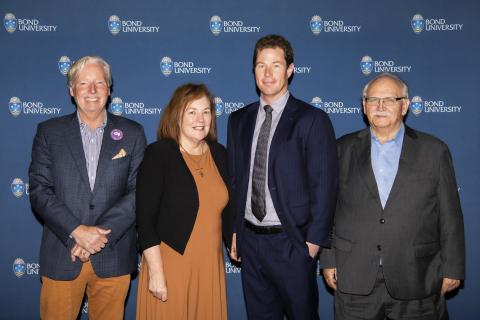
One of the key issues with Australia’s superannuation scheme is that retirees don’t want to spend it, experts say.
A panel of experts in superannuation has told a packed audience at Bond University that while Australia’s super system was ranked one of the world’s best, some design tweaks would make it more effective and more equitable.
Speaking at the Research Week event panellist Jeremy Cooper, author of the Rudd Government’s 2009 review into the nation’s super system, said one of the tasks facing government was convincing people to spend their money in retirement.
“We’ve got a massive behavioural problem of how we convince people, how we incentivise them, to spend that money down,” he said.
“We (need) to work out how we convince people that have been told for 40 years that it’s a great thing to save up the money for retirement.
“We have a wealth management industry whose sole purpose is building up money and very few advisers who tell their clients ‘you’re not spending enough money – spend it’. They don’t say that.”
Fellow panellist Professor Deborah Ralston agreed. The Future Fund Guardian and Monash University Professorial Fellow said it was time to reframe the language around super from ‘nest egg’ to ‘retirement income’ in a bid to encourage people not to hold on to the money.
Dr Michael O’Neill, Fund Manager at Investors Mutual and Honorary Adjunct Associate Professor at Bond University told the crowd it was clear Australia had a progressive system in terms of generating a pool of savings that stood the nation in good stead, but there was still work to be done in terms of superannuation outcomes and purpose.
The panel agreed that superannuation in its current form worked well for the majority of Australians but noted the discrepancy at the system’s edges – it didn’t work well enough for those on lower incomes, and worked too well for those on high incomes who needed it least.
Australian National University Emeritus Professor Ron Bird went a step further, saying the system was inequitable.
“It doesn’t work for the poorest people, and if it doesn’t work for those people then it’s not doing what it should,” he said.
“We don’t often talk about or hear about how much income people give up and the cost of building up this public money.
“They are forgoing income at a time when they probably need it most – having children and building lives, and probably earning less than they will later in their careers.
“Reviews have shown that even at 9.5 percent compulsory super we were putting in too much. There was a proposal out of London that said no one should be paying anything into super until they were in their 30s and then (their contribution level) should go up exponentially after that.”
Professor Ralston acknowledged the inequity, saying that most people would need around 65-70 percent of what they were earning prior to retirement to be comfortable.
“People earning between $40,000-90,000 seem to hit around about that target,” she said.
“People on less than that end up with more, but then a lot of those people are renters, so you have to take that into account, and people on above $90,000 are probably doing a bit better than they need to and they have other assets as well.”
But the system works well for the majority of people, she said, and they should have confidence in it.
The Bond Business Leaders Forum event was hosted by the University’s Professor of Finance David Gallagher.

